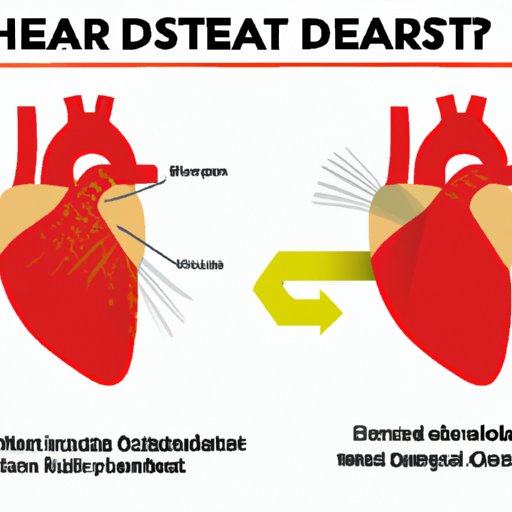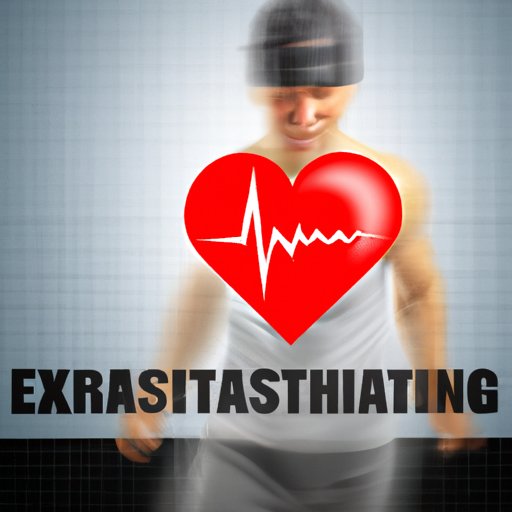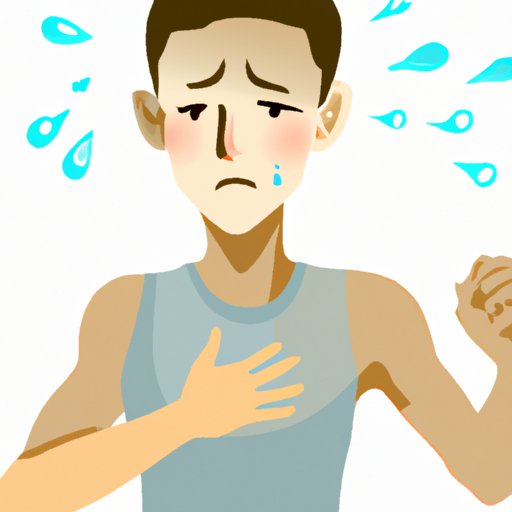
Examining the Connection Between Excessive Sweating and Heart Disease
Sweating is an important part of physical activity and helps regulate our body temperature. But when does sweating become excessive? And is excessive sweating during exercise a sign of heart disease? In this article, we’ll explore the connection between excessive sweating and heart disease, what to do if you are excessively sweating during exercise, recognizing the symptoms of heart disease through sweating, and exploring the link between perspiration and cardiovascular health.
Definition of Excessive Sweating
Excessive sweating is defined as sweating beyond what is necessary to cool the body. It can occur during physical activity or in situations where there is little to no activity. It can also occur without a trigger, such as stress or heat. The sweating can range from mild to severe and is usually accompanied by feelings of embarrassment and discomfort.
What Causes Excessive Sweating During Exercise?
There are several potential causes of excessive sweating during exercise. These include:
- Dehydration – When you don’t drink enough fluids your body will try to compensate by sweating more, which can lead to dehydration.
- Medications – Certain medications can cause excessive sweating.
- Anxiety – Anxiety can cause your body to sweat more than usual.
- Clothing – Wearing clothes that are too tight or made of synthetic materials can cause your body to overheat and sweat more.
Does Excessive Sweating Indicate a Heart Problem?
In most cases, excessive sweating during exercise is not a sign of a heart problem. However, if you are experiencing other symptoms such as chest pain, dizziness, or shortness of breath, it could be an indication of a more serious underlying medical condition, including heart disease.
How Can Excessive Sweating be Reduced?
If you are experiencing excessive sweating during exercise, there are steps you can take to reduce the amount of sweat you produce. These include:
- Drink plenty of fluids before, during and after exercise.
- Wear loose-fitting, breathable clothing.
- Take breaks when needed.
- Avoid caffeine and alcohol before exercising.
- Try relaxation techniques such as deep breathing or meditation.
What To Do If You Are Excessively Sweating During Exercise
If you are experiencing excessive sweating during exercise, it is important to talk to your doctor. Your doctor can help determine the cause of the excessive sweating and provide treatment options. They may also recommend lifestyle changes such as diet and exercise, as well as medications or supplements to help reduce the sweating.
It is also important to get regular medical checkups, even if you are not experiencing any symptoms. Regular checkups can help detect any underlying medical conditions that may be causing the excessive sweating.
You should also pay attention to your diet and consider taking supplements if necessary. Eating a healthy, balanced diet can help reduce the amount of sweat produced. Supplements such as magnesium and B vitamins can also help reduce sweating.

How to Recognize the Symptoms of Heart Disease Through Sweating
In some cases, excessive sweating can be a sign of a more serious underlying medical condition, such as heart disease. If you are experiencing other symptoms such as chest pain, dizziness, or shortness of breath along with excessive sweating, it is important to seek medical attention immediately.
Other symptoms of heart disease that may be associated with excessive sweating include:
- Sweaty palms
- Chest discomfort or pain
- Dizziness or lightheadedness
- Shortness of breath
Is Excessive Sweating A Sign Of Heart Disease?
Excessive sweating during exercise can be a sign of a more serious underlying medical condition, such as heart disease. While it is not always an indicator of a heart problem, it is important to be aware of the signs and symptoms of heart disease so that you can seek medical attention if necessary.
There are several factors that may contribute to excessive sweating, such as dehydration, medications, anxiety, and clothing. It is important to take steps to reduce the amount of sweat produced, such as drinking plenty of fluids, wearing loose-fitting, breathable clothing, and avoiding caffeine and alcohol before exercising.
The link between sweating and cardiovascular health is complex and not fully understood. However, regular exercise and maintaining a healthy diet can help improve cardiovascular health and reduce the risk of heart disease.

Exploring the Link Between Perspiration and Cardiovascular Health
Regular exercise and maintaining a healthy diet are two key components of overall cardiovascular health. It is important to stay hydrated during exercise and to recognize the signs of an unhealthy heart. If you have any of the symptoms listed above, seek medical attention immediately.
By exploring the connection between excessive sweating and heart disease, you can gain a better understanding of your own health and make informed decisions about how to reduce your risk of developing heart disease. By being aware of the signs and symptoms of heart disease, you can take steps to keep your heart healthy and reduce your risk of developing a more serious condition.
(Note: Is this article not meeting your expectations? Do you have knowledge or insights to share? Unlock new opportunities and expand your reach by joining our authors team. Click Registration to join us and share your expertise with our readers.)
